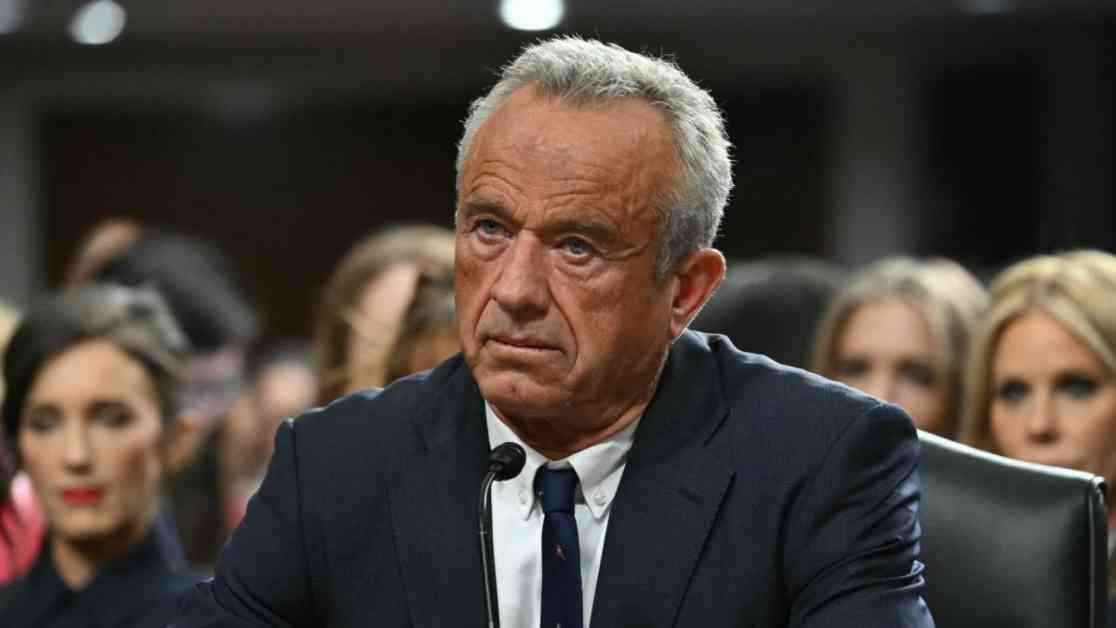Robert F. Kennedy Jr.’s Health Policy Views: A Complex Portrait
The recent confirmation of Robert F. Kennedy Jr. as the Secretary of the Department of Health and Human Services has sparked intense debate and controversy across the nation. The GOP-controlled Senate voted 52-48 in favor of confirming Kennedy, a well-known anti-vaccine activist, to lead one of the most powerful health care agencies in the country. This confirmation, largely along party lines, raised eyebrows and concerns about Kennedy’s unconventional and, at times, contentious health policy views.
Kennedy’s appointment as the Secretary of Health and Human Services has ignited a firestorm of criticism, particularly from Democratic lawmakers and public health officials. His long-standing stance as a vaccine skeptic, along with his opposition to conventional health practices, has left many questioning his ability to lead a vital government agency responsible for safeguarding the health and well-being of millions of Americans.
Controversial Health Policy Views
One of the most contentious aspects of Kennedy’s health policy views revolves around his stance on vaccines. Kennedy has been a vocal critic of childhood vaccines, claiming that they are unsafe and ineffective. His views align closely with those of President Donald Trump, who has also expressed skepticism about the safety of vaccines and their alleged connection to rising autism rates.
The belief that vaccines can cause autism traces back to a discredited study published in the 1980s by British doctor Dr. Andrew Wakefield. This study, which linked the MMR (mumps, measles, and rubella) vaccines to autism, has since been debunked by numerous large-scale research studies. The scientific community overwhelmingly supports the safety and efficacy of vaccines, emphasizing the critical role they play in preventing the spread of infectious diseases and protecting public health.
Raw Milk and Fluoride Controversy
Apart from his stance on vaccines, Kennedy’s controversial health policy views extend to other areas, such as the consumption of raw milk and the addition of fluoride to drinking water. Kennedy has advocated for lifting restrictions on raw milk, despite warnings from health officials about the potential risks associated with consuming unpasteurized dairy products.
Raw milk has been linked to numerous illness outbreaks over the years, leading to hospitalizations and significant health risks. The Centers for Disease Control and Prevention (CDC) have cautioned against the consumption of raw milk due to its susceptibility to contamination and harmful germs that can cause serious illnesses.
Similarly, Kennedy has expressed skepticism about the benefits of fluoride in drinking water, suggesting that the federal government should advise against its use. However, fluoride has long been recognized as a key element in preventing tooth decay and promoting dental health. The addition of fluoride to drinking water is considered a public health milestone, with the vast majority of Americans benefiting from its protective effects.
Medicaid, Medicare, and Abortion
As the newly appointed Secretary of Health and Human Services, Kennedy will oversee critical programs such as Medicaid, Medicare, and the Affordable Care Act. However, his remarks during the confirmation hearing raised concerns about his understanding of these programs, particularly the distinction between Medicaid and Medicare.
Kennedy’s views on Medicaid have drawn criticism, with some questioning his assessment of the program’s effectiveness in promoting positive health outcomes. Research studies have highlighted the benefits of Medicaid expansion, including a reduction in overall mortality rates and improvements in physical health for vulnerable populations.
Despite his support for abortion rights, Kennedy’s position on the issue remains complex, given the conflicting opinions within the Republican Party and conservative voter base. His commitment to addressing key health issues, such as restricting harmful ingredients in processed foods, has garnered widespread support from both Democrats and Republicans alike.
In conclusion, Robert F. Kennedy Jr.’s health policy views reflect a diverse and often contradictory spectrum of opinions on critical health-related issues. As he assumes his new role as the head of the Department of Health and Human Services, Kennedy faces the challenge of reconciling his controversial views with the demands of public health and safety. The coming months will undoubtedly shed light on the impact of his leadership on the nation’s health care landscape.


